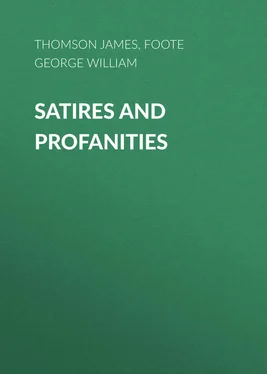George Foote - Satires and Profanities
Здесь есть возможность читать онлайн «George Foote - Satires and Profanities» — ознакомительный отрывок электронной книги совершенно бесплатно, а после прочтения отрывка купить полную версию. В некоторых случаях можно слушать аудио, скачать через торрент в формате fb2 и присутствует краткое содержание. Жанр: foreign_religion, foreign_antique, foreign_prose, на английском языке. Описание произведения, (предисловие) а так же отзывы посетителей доступны на портале библиотеки ЛибКат.
- Название:Satires and Profanities
- Автор:
- Жанр:
- Год:неизвестен
- ISBN:нет данных
- Рейтинг книги:4 / 5. Голосов: 1
-
Избранное:Добавить в избранное
- Отзывы:
-
Ваша оценка:
- 80
- 1
- 2
- 3
- 4
- 5
Satires and Profanities: краткое содержание, описание и аннотация
Предлагаем к чтению аннотацию, описание, краткое содержание или предисловие (зависит от того, что написал сам автор книги «Satires and Profanities»). Если вы не нашли необходимую информацию о книге — напишите в комментариях, мы постараемся отыскать её.
Satires and Profanities — читать онлайн ознакомительный отрывок
Ниже представлен текст книги, разбитый по страницам. Система сохранения места последней прочитанной страницы, позволяет с удобством читать онлайн бесплатно книгу «Satires and Profanities», без необходимости каждый раз заново искать на чём Вы остановились. Поставьте закладку, и сможете в любой момент перейти на страницу, на которой закончили чтение.
Интервал:
Закладка:
Thomson’s life was a long tragedy. He inherited from his father a fatal curse, and in his youth he lost the beautiful girl to whom he was engaged. She was the object of his passionate adoration, and allusions to her often occur in his poems. Her image mingled with all the sombre panoramas of Love and Death and Grief that passed before the eyes of his imagination. Yet I do not agree with Mr. Dobell in regarding this bereavement as the cause of his life-long misery. She was, I hold, merely the peg on which he hung his raiment of sorrow; without her, another object might have served the same purpose. He carried within him his proper curse, constitutional melancholia. From long and careful observation I formed this conclusion, and it explains Thomson’s life and philosophy. I would not dogmatise, however; for the profundities and subtleties of the human heart baffle all calculation. Certitude is now impossible. The seal of eternal silence is set on Thomson’s lips – “after life’s fitful fever he sleeps well.” He is buried at Highgate, and his darling lies, I suspect, in an unknown grave. Death has at last united them, but their love survives in the glory of immortal song.
THE DEVIL IN THE CHURCH OF ENGLAND
(1876.)
The Judicial Committee of the Privy Council has delivered judgment in the case of Jenkins v. Cook. Many of the highest personages in the realm, including the Archbishop of Canterbury and the great law-lords, were present to give weight and solemnity to the decision, which was read by the Lord Chancellor. It was reported at full length in the Times of the following day, Feb. 17, 1876, the length being two columns of small print.
I must try to indicate briefly the main facts of the case, before hazarding any comments on it. Mr. Jenkins, of Christ Church, Clifton, brought an action against his vicar, the Kev. Flavel S. Cook, for refusing him the Sacrament of the Holy Communion. Mr. Cook justified the refusal on the ground that Mr. Jenkins did not believe in the Devil, all passages relating to the Devil and evil spirits having been excluded from a bulky volume published by Mr. Jenkins, entitled “Selections from the Old and New Testaments.” By the evidence of Mrs. Jenkins, who attempted an amicable arrangement, it appears that Mr. Cook said to her: “Let Mr. Jenkins write me a calm letter, and say he believes in the Devil, and I will give him the Sacrament.” Whereupon Mr. Jenkins wrote on July 20, 1874: “With regard to my book, ‘Selections from the Old and New Testaments,’ the parts I have omitted, and which has enabled me [meaning, doubtless, and the omission of which has enabled me] to use the book morning and evening in my family are, in their present generally received sense, quite incompatible with region or decency (in my opinion). How such ideas have become connected with a book containing everything that is necessary for a man to know, I really cannot say; I can only sincerely regret it.” Mr. Cook replied in effect: “Then you cannot be received at the Lord’s table in my church.” Mr. Jenkins, a regular communicant, and admittedly a man of exemplary and devout life, answered: “Thinking as you do, I do not see what other course you could consistently have taken. I shall, nevertheless, come to the Lord’s table as usual at ‘your’ church, which is also mine.” Accordingly he presented himself, and was repelled, whereupon he brought an action against Mr. Cook.
The case was first tried in the Court of Arches, and the dean dismissed the suit and condemned Mr. Jenkins in costs, saying, “I am of opinion that the avowed and persistent denial of the existence and personality of the Devil did, according to the law of the Church, as expressed in her canons and rubrics, constitute the promoter [Mr. Jenkins] ‘an evil liver,’ and ‘a depraver of the Book of Common Prayer and Administration of the Sacraments,’ in such sense as to warrant the defendant in refusing to administer the Holy Communion to him until he disavowed or withdrew his avowal of the heretical opinion, and that the same consideration applies to the absolute denial by the promoter of the doctrine of the eternity of punishment, and, of course, still more to the denial of all punishment for sin in a future state, which is the legitimate consequence of his deliberate exclusion of the passages of scripture referring to such punishment.”
So far, so well; the Church of England was assured of the Devil and the eternal punishment it has always held so dear. But Mr. Jenkins appealed to the highest court, and this has reversed the decision of the lower, admonished Mr. Cook for his conduct in the past, monished him to refrain from the like offence in future, and condemned him in the costs of both suits. Do you think, then, that the Church of England is authoritatively deprived of her dear Devil and her beloved eternal punishment? Not at all; the really important problem is evaded with consummate lawyerlike wariness; the points in dispute are most shiftily shifted like slides of a magic lantern; we have a new decision essentially unrelated to that which it cancels; we have a judgment which concerns not the Devil – except that he would chuckle over the too clever unwisdom which fancies it can extinguish “burning questions” with legal wigs.
Their most learned lordships in the first place observe that the learned judge of the Court of Arches appears to have considered that the canon and the rubric severally warrant the repulsion from the Lord’s table of “an evil liver,” and “a depraver of the Book of Common Prayer,” whereas the terms are “an open and notorious evil liver,” and “common and notorious depravers.” This is a most pregnant distinction, teaching us that an evil liver and a depraver of the said book, as long as he is not notoriously such, is fully entitled to the Holy Communion, fully entitled to the privilege of “eating and drinking damnation to himself?” a privilege from which the notorious evil liver and depraver is righteously debarred.
Now, their most learned lordships find that there is absolutely no evidence that the appellant was an evil liver, much less an open and notorious evil liver. The Question follows, Was he a common and notorious depraver of the Book of Common Prayer? It was contended that the Selections, coupled with the letter of July 20, proved him to be this. But the letter was not written spontaneously. He was invited by the respondent, Mr. Cook, to write it. It was a friendly and private, as well as a solicited, communication. Therefore, whatever be the construction of the letter, and even if there be in it a depravation of the Book of Common Prayer, still it would be impossible to hold that the writing of such a letter in such circumstances could make the appellant “a common and notorious depraver.” Whence it is clear that a man may deprave the Book of Common Prayer as much as he pleases in private conversation and letters, yet retain the precious privilege of “eating and drinking damnation to himself” in the Holy Communion; he can only forfeit this by common and notorious depravation of that blessed book – for instance, by a depravation repeatedly published in a newspaper, or persistently proclaimed by the town-crier.
So far the law seems most clear, and the judgment quite incontestible. But leaving the strait limits of the law, and looking at the facts in evidence, there is one part of the judgment which to the common lay mind is simply astonishing. Their most learned lordships “ desire to state in the most emphatic manner that there is not before them any evidence that the appellant entertains the doctrines attributed to him by the Dean of Arches ;” wherefore their most learned and subtle lordships “do not mean to decide that those doctrines are otherwise than inconsistent with the formularies of the Church of England.” Nor, of course, do they mean to decide that those doctrines are inconsistent with, those formularies. No, “This is not the subject for their lordships’ present consideration.” Indeed, “If they were [had been] called upon to decide that [whether] those opinions, or any of them, could be entertained or expressed by a member of the Church, whether layman or clergyman, consistently with the law and with his remaining in communion with the Church, they would have looked upon this case with much greater anxiety than they now feel in its decision.”
Читать дальшеИнтервал:
Закладка:
Похожие книги на «Satires and Profanities»
Представляем Вашему вниманию похожие книги на «Satires and Profanities» списком для выбора. Мы отобрали схожую по названию и смыслу литературу в надежде предоставить читателям больше вариантов отыскать новые, интересные, ещё непрочитанные произведения.
Обсуждение, отзывы о книге «Satires and Profanities» и просто собственные мнения читателей. Оставьте ваши комментарии, напишите, что Вы думаете о произведении, его смысле или главных героях. Укажите что конкретно понравилось, а что нет, и почему Вы так считаете.












